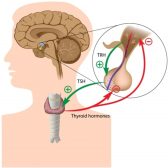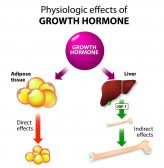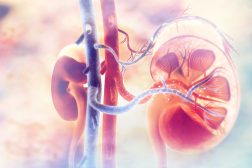Definition
noun, plural: hormones
(physiology) Any of the substances produced and secreted by an endocrine gland, and then transported via the bloodstream to reach the target organ or tissue; a synthetic compound acting like a natural hormone
(botany) A phytohormone, i.e. any of the various plant compounds that are essential to the growth and differentiation of plant tissue
Supplement
In physiology, a hormone refers to any substance produced and secreted by an endocrine gland. An endocrine gland is a ductless gland of the endocrine system. The glands of the endocrine system include pineal gland, adrenal gland, hypothalamus, parathyroid gland, thyroid gland, pituitary gland, pancreas, ovaries, and testes. Nevertheless, the term hormone is sometimes used to include signaling molecules involved in autocrine and paracrine signaling.
In endocrine signaling system, the cell produces hormones and secretes them by exocytosis into the bloodstream. The hormones reach the target cell and are recognized via membrane proteins or intracellular receptors. Depending on the type of hormones, the effects may either be activation or inhibition. Hormones are involved in growth, circadian rhythm, apoptosis, immune response, metabolism regulation, reproductive activities, homeostasis, and other metabolic activities.
Hormones may be hydrophilic, like insulin, in which case the receptors are on the cell surface or lipophilic, like the steroids, where the receptor can be intracellular. Some cancers may be stimulated and others inhibited by hormones (for example breast and prostate cancer). Some hormones can be synthesised and used as replacement in glandular deficiencies or as treatment for some cancers. Hormones may be injected, others taken by mouth.
Animal hormones include steroids, eicosanoids (e.g. derivatives of arachidonic acid, lipoxins, and prostaglandins), and amino acid derivatives (e.g. melatonin and thyroxine). Some hormones are produced synthetically to exert effects similar to natural hormones.
Plant hormones, called phytohormones, are hormones produced in plants. Some of the phytohormones are abscisic acid, auxin, ethylene, gibberellin, and cytokinin.
Word origin: Greek hormḗ, hormáō, hormô (“to set in motion”)
See also:
Related term(s):
- Antidiuretic hormone
- Corpus luteum hormone
- Follitropin-releasing hormone
- Gametokinetic hormone
- Heart hormone
- Hormone antagonists
- Hypophysiotropic hormone
- Inappropriate hormone
- Mammotropic hormone
- Natriuretic hormone
- Parathyroid hormone
- Prolactin-releasing hormone
- Proparathyroid hormone
- Releasing hormone
- Sex hormone
- Sympathetic hormone
- Thyroid hormone









